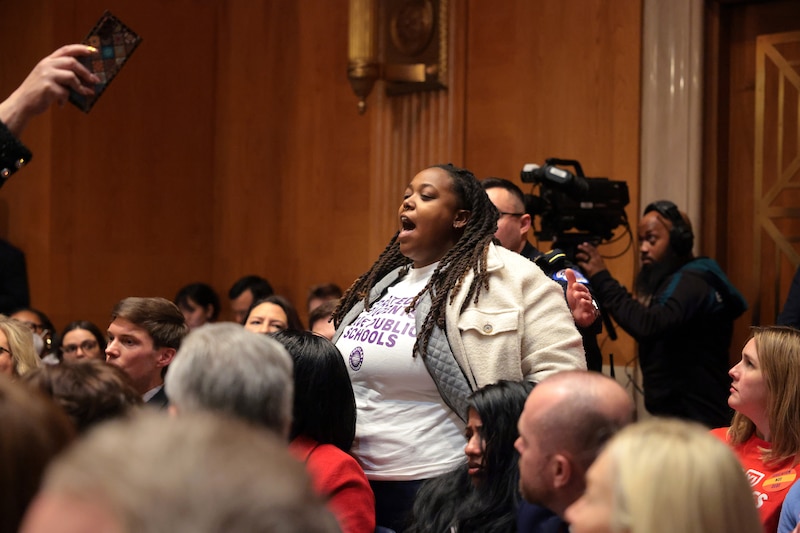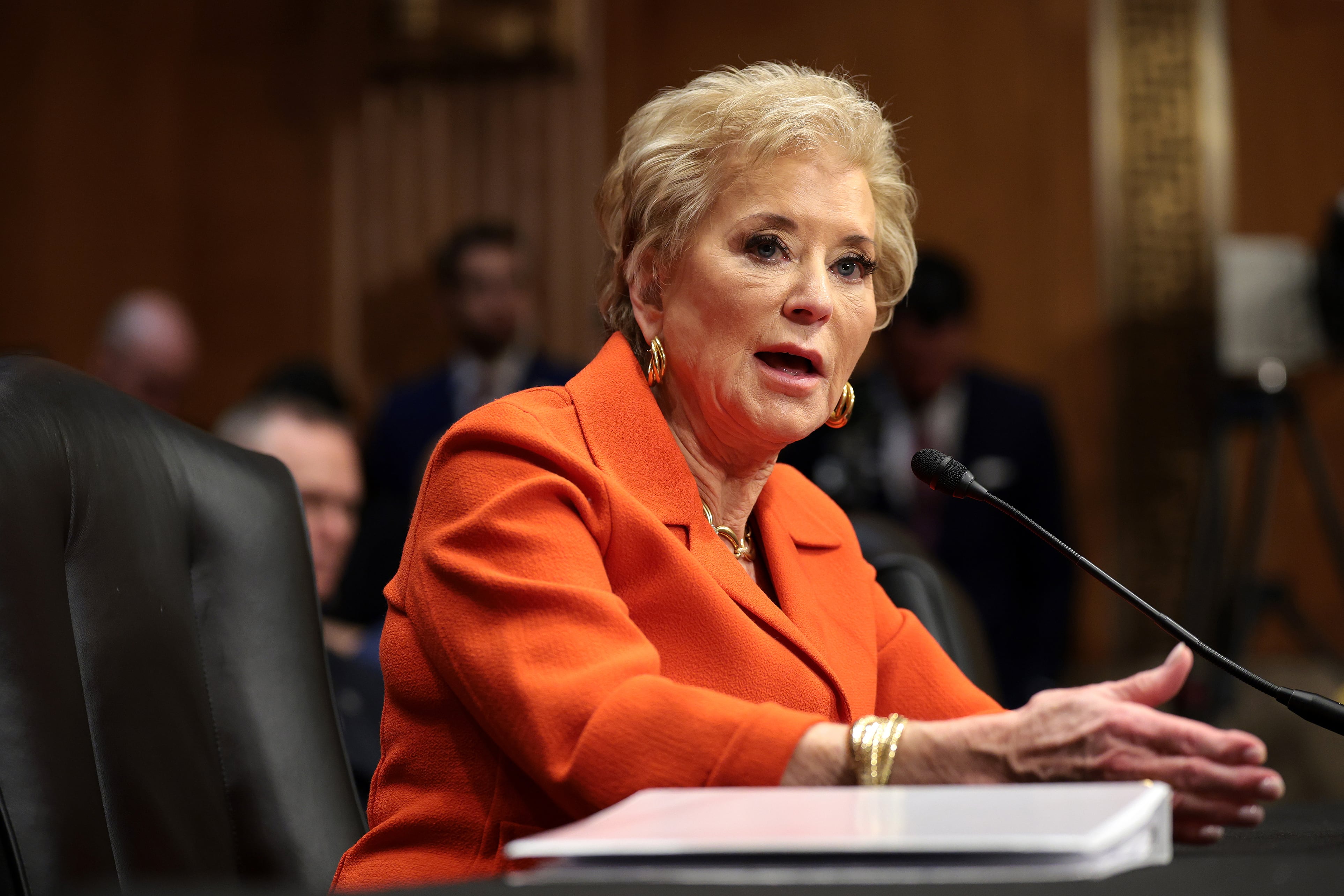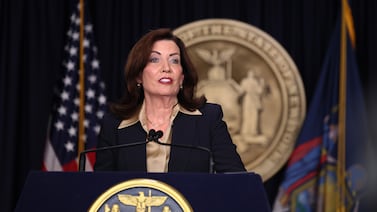Sign up for Chalkbeat’s free weekly newsletter to keep up with how education is changing across the U.S.
Linda McMahon said she stands firmly behind President Donald Trump’s calls to gut the U.S. Department of Education at her confirmation hearing to lead the department.
But she promised to work with Congress to do so — acknowledging some limits on the president’s authority as Trump seeks to remake the government through executive orders. And she tried to reassure teachers and parents that any changes would not jeopardize billions in federal funding that flows to high-poverty schools, special education services, and low-income college students.
“We’d like to do this right,” McMahon said. “It is not the president’s goal to defund the programs, it is only to have it operate more efficiently.”
Trump has called the Education Department a “con job” and said that McMahon, a former professional wrestling executive and billionaire Republican donor, should work to put herself out of a job. McMahon called this rhetoric “fervor” for change.
The Trump administration’s chaotic approach to spending cuts so far raise questions about whether McMahon’s statements — an effort to neutralize the most significant criticism of plans to get rid of the Education Department — will prove true over time.
Thursday’s hearing before the Senate Committee on Health, Education, Labor, and Pensions, punctuated by occasional protests, served as a referendum of sorts on the value of the Education Department. Republicans said it had saddled schools with red tape without improving student outcomes. Democrats said the department protects students’ civil rights and funds essential services.
Democrats also pressed McMahon on Trump’s threats to withhold federal funding from schools that violate his executive orders and on the details of a potential reorganization — questions that McMahon largely deflected as ones she could better answer after she takes office.
“It’s almost like we’re being subjected to a very elegant gaslighting here,” said Sen. Maggie Hassan, a Democrat from New Hampshire.
McMahon pressed on what DEI orders might mean
Even as Trump has called for the Education Department to be eliminated and schooling to be “returned to the states,” he’s also sought to expand its mission with executive orders threatening the funding of schools that employ diversity, equity, and inclusion practices or teach that racism and discrimination were part of America’s founding. The federal government is barred by law from setting local curriculum, as Republican Sen. Lisa Murkowski of Alaska pointed out during the hearing.
In a tense exchange, Sen. Chris Murphy, a Democrat from Connecticut who’s championed school desegregation and diversity efforts in education, asked McMahon how schools would know if they were running a program that violates Trump’s executive order seeking to root out “radical indoctrination” in K-12 schools. Many schools have no idea what’s allowed, Murphy said, because the order doesn’t clearly define what’s prohibited.
McMahon said in her view, celebrating Martin Luther King Jr. Day and Black History Month should be permitted, after Murphy noted that U.S. Department of Defense schools would no longer celebrate Black History Month in response to Trump’s order.
But McMahon would not say that running affinity groups for students from certain racial or ethnic backgrounds, such as a Black engineers club or an after-school club for Vietnamese American students, was permitted. She also would not say whether schools might put their federal funding at risk by teaching an African American history class or other ethnic studies program.
“That’s pretty chilling,” Murphy said. “You’re going to have a lot of educators and a lot of principals and administrators scrambling right now.”
Later in the confirmation hearing, McMahon agreed schools should teach “the good, the bad, and the ugly” parts of U.S. history, and that it’s up to states, not the Department of Education, to establish curriculum.
McMahon’s record on DEI has sometimes been at odds with the Trump administration. She backed diversity issues when she served on the Connecticut State Board of Education, the Washington Post reported.
During her hearing, McMahon said DEI programs are “tough,” because while they’re put in place to promote diversity and inclusion, they can have the opposite effect. She pointed to examples of Black and Hispanic students attending separate graduation ceremonies — though those are typically held to celebrate the achievements of students of color, not to isolate them.
Republicans see McMahon as an outsider who can overhaul department
McMahon told the committee that many Americans are experiencing an educational system in decline — she pointed to sobering national test scores, crime on college campuses, and high youth suicide rates — and said it was time for a renewed focus on teaching reading, math, and “true history.”
“In many cases, our wounds are caused by the excessive consolidation of power in our federal education establishment,” she said. “So what’s the remedy? Fund education freedom, not government-run systems. Listen to parents, not politicians. Build up careers, not college debt. Empower states, not special interests. Invest in teachers, not Washington bureaucrats.”
Republican Senators reiterated these themes, arguing that bureaucrats in Washington had had their chance and that it was time for a new approach.
They asked McMahon about Trump administration priorities such as expanding school choice, including private school vouchers, and interpreting Title IX to bar transgender students from restrooms and sports teams aligned with their gender identities.
McMahon said she was “happy” to see the Biden administration’s rules on Title IX vacated, and she supported withholding federal funds from colleges that did not comply with the Trump administration’s interpretation of the law.
Teachers unions and other critics of McMahon have said she lacks the proper experience to lead the Education Department, though McMahon and others have pointed to her time serving on the Connecticut State Board of Education, as a trustee of Sacred Heart University, and her role as chair of the America First Policy Institute, where she advocated for private school choice, apprenticeships, and career education.

McMahon also ran the Small Business Administration in Trump’s first administration. Her understanding of the federal bureaucracy is an asset, supporters say.
Sen. Tim Scott, a Republican from South Carolina, said McMahon’s background made her uniquely suited to tackle the pressing challenges facing the American education system today.
“For the poorest kids in our country, disillusioned about the American dream, the answers they are looking for rarely come from Washington,” Scott said. “With all of our good intentions, the Department of Education has simply failed the poorest kids in the United States of America, the greatest nation on the planet. To turn that around, we need someone who’s already succeeded in business and in government.”
Funding, protections for students with disabilities at stake
McMahon said multiple times that parents of children with disabilities should not worry about federal funding being cut for the Individuals with Disabilities Education Act, though she said it was possible that the U.S. Department of Health and Human Services would administer the money instead of the Education Department.
But it appeared that McMahon had limited knowledge of the rights outlined in IDEA, the landmark civil rights law that protects students with disabilities. And she said it was possible that civil rights enforcement — a large portion of which is related to complaints about children with disabilities not getting the services to which they’re entitled — would move to the U.S. Department of Justice.
Dismantling the education department by moving key functions to other departments is a tenet of Project 2025, the playbook the conservative Heritage Foundation developed for a second Trump administration. Most of these functions are mandated in federal law, and moving them would require congressional approval.
McMahon struggled to articulate the goals of IDEA beyond saying students would be taken care of and get the assistance and technology they need.
“There is a reason that the Department of Education and IDEA exist, and it is because educating kids with disabilities can be really hard and it takes the national commitment to get it done,” Hassan, the New Hampshire senator, said. “That’s why so many people are so concerned about this proposal to eliminate the department. Because they think kids will once again be shoved aside, and especially kids with disabilities.”
McMahon also could not name any requirements of the Every Student Succeeds Act, the federal law that replaced No Child Left Behind. ESSA requires states to identify low-performing schools and intervene to improve student learning, but it gives states more flexibility in how they do so than the previous law.
McMahon seemed open to reversing some of the cuts enacted by the U.S. DOGE Service, the cost-cutting initiative led by billionaire Elon Musk.
She said, if confirmed, she would look into whether staff who’d been placed on administrative leave — including some who investigate civil rights complaints — should return. She also said she’d assess the programs that were cut when DOGE terminated 89 contracts at the Institute of Education Sciences and 29 training grants.
Sen. Susan Collins, a Republican from Maine, said her office had heard from a former teacher who developed an intensive tutoring strategy that was used in a dozen schools in the state. The teacher had a pending grant application to evaluate the program and its effect on student outcomes, and the teacher worried it would be in jeopardy. Collins asked if the department should keep collecting that kind of data so it could help states determine what’s working for kids.
“I’m not sure yet what the impact of all of those programs are,” McMahon said. “There are many worthwhile programs that we should keep, but I’m not yet apprised of them.”
The Senate education committee is scheduled to vote on McMahon’s confirmation on Feb. 20.
Erica Meltzer is Chalkbeat’s national editor based in Colorado. Contact Erica at emeltzer@chalkbeat.org.
Kalyn Belsha is a senior national education reporter based in Chicago. Contact her at kbelsha@chalkbeat.org.







